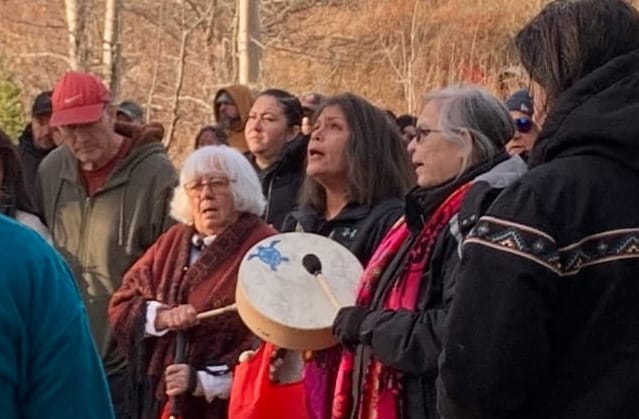Basketmaker’s life honored by many
A Passamaquoddy master basketmaker who was the matriarch of four generations of tribal basket-weavers is being remembered by her family, other tribal members and numerous arts organizations for her work to pass on the traditional craft to future generations.
A Passamaquoddy master basketmaker who was the matriarch of four generations of tribal basket-weavers is being remembered by her family, other tribal members and numerous arts organizations for her work to pass on the traditional craft to future generations. Molly Neptune Parker of Indian Township, who was the recipient of a 2012 National Heritage Fellowship, the nation's highest honor in the folk and traditional arts, passed away on June 12 at the age of 81.
Donald Soctomah, Passamaquoddy tribal historian, says, "Molly was a cultural icon for the Passamaquoddy Tribe. She was an award-winning basketmaker, but more than that she knew things about our culture." He remembers when he was working on the wax cylinder project, trying to understand the 1890 recordings of Passamaquoddy songs, language and cultural narratives, that he had her listen to the recordings, and she provided "cultural input that not many today would understand."
She was the first woman lieutenant governor at Indian Township, and Soctomah also relates that she was among the tribal members who first went to Washington, D.C., in the 1970s to lobby Congress for the tribe's treaty rights, before the 1980 land claims settlement act. "She knew how to get her point across," he notes.
As the grandmother of seven of Soctomah's children, she "did everything for her family. She wanted to make sure they succeeded in life. Whenever anyone needed help, she was always there for other people."
Soctomah relates that she taught her children, grandchildren and great-grandchildren how to make baskets, along with "hundreds of others" at workshops. Among them were descendants of Franklin Delano Roosevelt, who summered on Campobello. She could tell who made a particular basket and the year it was made. In the 1970s, she ran the Passamaquoddy basket co-op, which "put a lot of people to work making different types of baskets," Soctomah says. She also was a businesswoman, running Mihku Lodge in Indian Township for 20 years, with a restaurant "that fed the community."
"She will be missed by the whole community. She was like a mother to everybody," Soctomah says.
A long procession of vehicles traveled from Indian Township to the funeral Mass at Immaculate Conception Church in Calais on June 18, and Soctomah notes that cars pulled over to let the procession pass both to and from the church. "It was like the whole county was honoring her."
The National Endowment for the Arts' (NEA) National Heritage Fellowship award noted that Parker's mother, grandmother and aunts all made baskets and that she then made baskets with the same ash flower design on the top that her mother and grandmother used. Parker was known for her fancy baskets, featuring intricate weaving techniques, such as her signature creation, the acorn shaped basket. The award noted that Parker was "a true tradition bearer," mentoring others, including her grandchild Geo Neptune.
"Basketmaking for me is about innovation and creativity within the context of a traditional art form," Parker said in 2012, after being awarded the NEA fellowship. "The functionality, the materials and the shapes have been a legacy for each generation. I honor that legacy and believe I have a responsibility to continue it, basing it always on our traditions and knowledge of literally thousands of years. Basketmaking is an art that I believe I was born to do, much as my ancestors have done for thousands of years."
Parker was a master teacher in the Maine Arts Commission's traditional arts apprenticeship program and demonstrated her craft at the 2006 Smithsonian Folklife Festival as well as local festivals and schools. The Maine Indian Basketmakers Alliance noted that Parker was the longest serving president of the alliance and stated in a Facebook posting that, as a kind, funny and generous person, she was a role model to many. In acknowledging her passing, the First Peoples Fund, which honored her in 2008 with a community spirit award, noted that Parker was a leader in the resurgence of Wabanaki basketry in Maine. She believed, "When I hold a basket of someone who has gone before, I am holding part of them and it is a link to the future and all the hands that will hold it. Art is both a way of healing by learning the discipline of basketmaking while being a means of expression."
Parker was selected to be one of the 13 Women of Vision recipients of the Farnsworth Art Museum's Maine in America Award. Farnsworth Director Christopher Brownawell commented, "Her dedication in preserving the Passamaquoddy traditions and values was equaled only in her passion for passing on her knowledge to future generations. Maine and the nation have lost a true Woman of Vision." The Farnsworth is looking forward to celebrating Parker, along with other Women of Vision, as recipients of the museum's Maine in America Award in the coming year and leading up to an award ceremony in 2021.
Maine Governor Janet Mills stated, in part, "Molly Neptune Parker's devotion to preserving the history, culture and artistry of the Passamaquoddy Tribe was shown in every aspect of her life. ... Maine is incredibly fortunate that Molly gifted these traditions to younger generations. That will be Molly's enduring legacy, and I hope it offers some comfort to her loved ones as they mourn her passing. The State of Maine is a better place for her presence in it."

